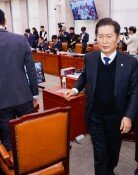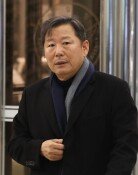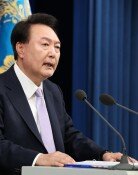Prosecutors disclose indictment against former defense minister
Prosecutors disclose indictment against former defense minister
Posted January. 06, 2025 08:02,
Updated January. 06, 2025 08:02
With investigations of the Dec. 3 martial law declaration underway, the prosecutors brought charges against former national defense minister Kim Yong-hyun, writing in an indictment, “The ex-minister engaged in a conspiracy with his accomplices and President Yoon Suk Yeol to stir up an insurrection to topple the constitutional government.” That is, they concluded that the two leaders closed off the National Assembly and invaded the National Election Commission (NEC) while trying to detain and arrest key persons without a warrant, regarding it as an insurrection aiming at overthrowing the constitutional government, which constitutes treason.
It is not an exaggeration to say that an 82-page-long indictment against former minister Kim is no different from targeting President Yoon. The prosecution viewed the martial law declaration as a rebellious act led by President Yoon and ex-minister Kim to overthrow the constitutional government, confirming that it was President Yoon who stood at the helm. The indictment mentions 'president' as many as 141 times. With references to the presidential office, chief of staff at the presidential office, and others included, the number rises to 152. In addition, President Yoon is mentioned more times than the ex-minister, against whom the indictment is written (124 times). Based on the prosecutors’ conclusion, former minister Kim was simply a loyal servant, helping President Yoon, the main culprit behind the insurrection, with key duties, according to the president’s will.
The indictment involves the unconstitutional and unlawful nature of the emergency martial law declaration on Dec. 3 last year by referring to President Yoon’s thoughts about “presidential emergency powers,” gatherings with “generals who are loyal to the president,” preparations of the declaration, the statement and the proclamation; the cabinet meeting where martial law was unilaterally notified; attempts to arrest key figures and confiscate election data without a warrant; and a master plan to form a temporary parliamentary body after shutting down the National Assembly. The president's continuous refusal of the arrest warrant, leading to a tense standoff, is probably because he has no option but to fight over legal arguments to avoid arrest.
In this regard, President Yoon’s strong reaction to lawmakers’ announcement that they would drop the charge of insurrection from the impeachment case at the Constitutional Court can be seen as an extension of such attempts. The opposition parties claim that the decision of guilt or innocence regarding the treason charge as per the Criminal Act is to be made in a criminal trial, adding that the Constitutional Court should thus focus on the constitutionality of the martial law declaration. However, President Yoon and the ruling party show a fierce objection, arguing that the impeachment itself loses validity if the insurrection charge, which is believed to be at the core of the issue, is dropped.
It is doubtful whether the change to the prosecution grounds is upsetting enough that President Yoon and the ruling party react with such an uproar. When former President Park Geun-hye was impeached previously, the National Assembly stated that they would not judge on the criminal responsibility of bribery and coercion, focusing solely on the constitutionality of the case. Coincidentally, the then-impeachment manager was Kweon Seong-dong, floor leader of the ruling party. After all, the final decision-maker will ultimately be the Constitutional Court. What matters more as of now is to mitigate political uncertainties that only fuel division and confrontation quickly.







